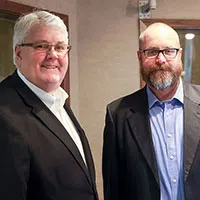Lincoln State Senator Danielle Conrad has claimed Nebraska’s Attorney General Mike Hilgers has “defied the rule of law” in regards to a previously issued legal opinion, giving rise to a new package of bills the Senator says will, “put more power into the people’s hands.”
Friday, Sen. Conrad introduced the first two bills of a four bill legislative effort that, if passed, will adjust the abilities of the Attorney General (AG) to issue proactive legal opinions that have blocked state “watchdogs” from carrying out their duties to examine systemic issues within government agencies, namely, the Nebraska Department of Correctional Services (NDCS) and the Department of Health and Human Services (DHHS).
AG Hilgers released a legal opinion in August which argued the power of legislature-established Inspector General (IG) offices to investigate claims of bureaucratic waste, fraud, or abuse, actively violated the separation of powers clause of the State Constitution and impaired the powers of the Executive Branch and State Judiciary to govern their operations.
While this was non-binding, the AG’s opinion resulted in IG investigations being cut short.
The Nebraska Ombudsman’s Office is tasked with investigating citizen complaints about state government and working toward resolution of issues. With in the ombudsman office, exists two groups providing government oversight — the Office of Inspector General of Nebraska Child Welfare and the Office of Inspector General of the Nebraska Correctional System.
As detailed by the Nebraska Examiner, both offices were established by state lawmakers to investigate, respectively, claims of suspicious deaths/injuries within NDCS and allegations of sexual abuse/cases of self harm involving foster children and those housed at state youth treatment facilities.
Since the issuance of AG Hilgers opinion, the Ombudsman’s Office says it’s been blocked from performing inspections of state facilities — also detailed by the Examiner.
Sen. Conrad, a lawyer, is offering a legislative solution to this conflict and rebuking AG Hilgers “weaponization of a legislative granted authority for him to issue opinions.”
The first two bills of the package, LB1191 and LB1192, were introduced Friday.
LB1191 which would rescind the AG’s legislative grant of authority to issue proactive legal opinions, and LB1192 would strengthening citizen remedies to hold state agencies accountable for harm or death of Nebraskans in their care.
The two remaining bills, to be introduced next week, would strengthen taxpayer standing for citizens to hold government agencies accountable, and bolster an Inspector General’s ability to perform robust legislative and citizen oversight.
Sen. Conrad characterized AG Hilgers’ actions as “very dangerous” to KLIN News.
“The Attorney General has defied the rule of law. State agencies have followed his guidance in that regard,'” said Conrad, “The law is the law until a court says otherwise. But apparently this Attorney General doesn’t heed that clear understanding in our democracy. So I’m very serious about bringing forward these solution oriented measures to keep this issue before the legislature so we can resolve these matters and ensure accountability for big government agencies that have fleeced taxpayers and hurt vulnerable kids.”
Regarding the section of this package aimed at bolstering citizen remedies to these issues, Conrad said, “Historically, Nebraska has always had a more robust access to the court for citizens/taxpayers to challenge acts of government… Over the years, through a series of court decisions and legislative enactments, that power has been severely curtailed. Now it’s much harder for an everyday citizen to get into court and challenge their government,” Conrad imparted.
“One component of this package of bills is to restore that robust taxpayer standing, so everyday citizens can hold their government accountable when it commits waist, fraud, abuse, or when it harms somebody,” said Conrad.
Another goal of this legislative effort is to remove the states ability to claim “sovereign immunity,” a legal term derived from British common law on the idea that the King could do no wrong. In the United States, sovereign immunity means the government cannot be sued without its consent. Conrad said she seeks to, “remove that special protection for some of those state agencies, so they can be held accountable in a court of law when they commit misdeeds.”
Lastly, Conrads’ package aims to buttress the abilities of IG offices, to prevent a similar situation in the future, “…without conceding to any of the misguided political arguments the Attorney General has made, so we can continue our good work on legislative oversight.”
The people’s ability to offer checks and balances on the state has already come up this year, namely State Senator Lou Ann Linehan’s attempt to save her bill — offering tax credits for private schools scholarships — from a voter decision in 2024.
“Hopefully that will be a recurring theme in the 2024 legislature,” Conrad told KLIN News, “We’ve had a serious lack of accountability in state government, and it’s important for the people’s branch — through the legislature or through the rights reserved to them (i.e. initiative and referendum) — that we really strengthen those mechanisms to put the people first.”
Conrad said she hadn’t yet spoken with Hilgers about these measures, “I anticipate that we’ll have a good dialogue about these issues, and I really hope that he will join me in strengthening legal mechanisms to return and restore the power to the people.”
Finally, we asked Conrad how we might refer to this legislative package of bills?
“It’s about standing up for legislative oversight and putting more power into the people’s hands so they can hold big government accountable,” Conrad concluded, “So maybe the ‘Power to the People Act.'”







